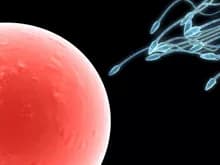The science of breeding chickens has revealed part of the mystery of how certain female animals are able to store sperm long-term. Droplets of fat transferred from female cells to sperm cells may contribute to keeping sperm alive.
Females of some types of insects, reptiles, and birds can store sperm from multiple males within specialized sperm storage areas of their reproductive tracts. Different animals can store sperm for days or years. Stored sperm can fertilize multiple eggs over time, meaning females do not need to mate again to fertilize additional eggs.
"Farmers may be able to more successfully breed their flocks if we could understand how the sperm stays viable in the sperm storage tubules of female chickens. Fertility studies like this are especially relevant to countries that breed native chickens with lower reproductive rates," said Yukinori Yoshimura, Ph.D., leader of the Research Center for Animal Science and Professor in the Graduate School of Biosphere Science at Hiroshima University.
Yoshimura led the research team that identified five types of lipid, or fatty acids, that exist as droplets inside the cells of female chickens' sperm storage tubules. After the chickens were artificially inseminated, a gene responsible for breaking down those lipids became 2.5 times more active. These broken-down lipids may be released into the sperm storage tubules and improve the sperm's survival.
Researchers stored freshly collected chicken sperm in solutions containing different concentrations of the individual lipids. High concentrations of two types of lipid, oleic acid and linoleic acid, increased the number of sperm still alive after 24 hours.
"We are doing ongoing research into the cell biology of how the female cells and sperm cells use these lipids, but I also want to examine if supplementing the female chickens' diet with olive fruits or sunflower seeds, foods high in oleic acid, could enhance fertility," said Yoshimura.
All chickens have the same basic reproductive biology and research on how sperm storage affects female fertility is relevant to both meat and egg varieties of farm chickens.
Sperm storage by female mammals is documented only in bats, but industries as diverse as thoroughbred horse breeding and endangered animal conservation also rely on assisted reproduction techniques. A scientific understanding of how sperm can be kept viable longer could benefit any fertility-related work.
The United Nations Food and Agriculture Organization statistics from 2013 report that 9.6 million tons of chicken were produced globally, making it number 18 in the list of the world's 50 most common food commodities. Chicken eggs were number 26, with 6.8 million tons produced globally.
The above post is reprinted from materials provided by Hiroshima University. Note: Materials may be edited for content and length.
Disclaimer: DoveMed is not responsible for the adapted accuracy of news releases posted to DoveMed by contributing universities and institutions.
Primary Resource:
Huang, A., Isobe, N., Obitsu, T., & Yoshimura, Y. (2016). Expression of lipases and lipid receptors in sperm storage tubules and possible role of fatty acids in sperm survival in the hen oviduct. Theriogenology, 85(7), 1334-1342.
Related Articles
Test Your Knowledge
Asked by users
Related Centers
Related Specialties
Related Physicians
Related Procedures
Related Resources
Join DoveHubs
and connect with fellow professionals


0 Comments
Please log in to post a comment.